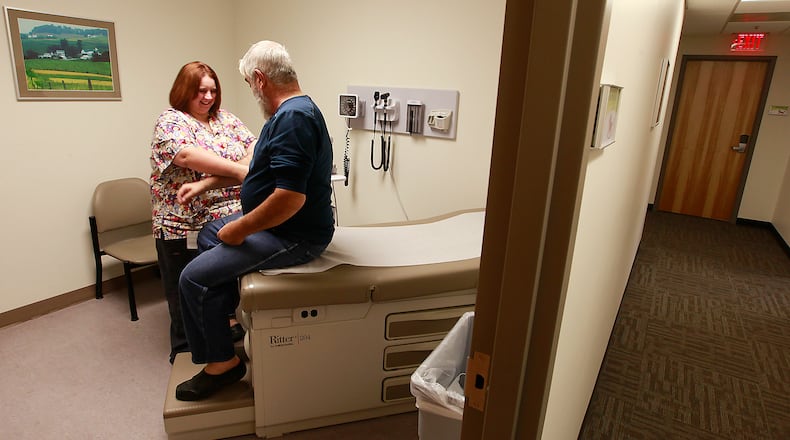Structural changes include expanding from five to seven managed care plans and renegotiating requirements for those Medicaid managed care insurance companies through the procurement process, which were the first changes to take place since the Centers for Medicare and Medicaid Services approved Ohio’s program in 2005.
“This is the largest renegotiation of the state’s Medicaid program in more than a decade, and it represents a fundamental shift in the way that we pay for things,” said Loren Anthes, head of policy and programs at Yuvo Health, a health tech company working with federally qualified health centers.
Managed care is a significant portion of the state’s budget. Medicaid takes up about 40% of the state’s budget, including state and federal funding, and nearly one-third of the funds that Ohio appropriates for Medicaid flows through one of these managed care programs, Anthes said.
Additionally, a change was needed to help get Ohioans better results for what they’re paying for with health care. Ohio ranks 47th out of 50 states and D.C. on health value, according to the Health Policy Institute of Ohio, a statewide organization focused on health policy analysis.
“We’re spending more money than average, and we get worse outcomes than average,” Anthes said.
Ohio Medicaid said its goals for this Next Generation launch included improving health outcomes for its 3.6 million enrollees—of which, 1.2 million are children—by providing additional supports, such as enhanced support for member transportation, after-hours behavioral health crisis services, 24/7 medical advice, individualized care coordination and management, and more support for preventative care.
“It’s shifting the focus more on to the people who are enrolled, and those are good goals to have as you embark on a new program,” said Tara Britton, director of policy at Community Solutions, a think tank focused on health, social, and economic issues in Ohio.
Ohio Medicaid’s updated managed care program is also expected to provide increased program transparency and reduce administrative burdens on providers.
2019 procurement process
With this launch, the state said it wanted to focus “on the individual and not just the business of managed care,” reaching out to stakeholders like enrollees and providers to best understand their needs.
“Within a couple of days (of DeWine taking office in 2019), he said to me, ‘I want you to transform this program into a program that is more about the individual Ohioans we serve,” said Maureen Corcoran, director of the Ohio Department of Medicaid.
The procurement process included the state receiving feedback from providers, enrollees, and other entities that engage with Medicaid that companies providing managed care plans had to address.
Corcoran said they hosted town halls across the state, facilitated interview sessions with consumers, and received over 1,000 sets of written suggestions during this process.
Jim Tassie, deputy director of Ohio Medicaid’s Office of Managed Care, said every aspect was looked at with regard to suggestions made about managed care.
“All of that feedback was taken into consideration when they put the bid out,” Britton said. The seven managed care plans were selected based on their focus on social determinants of health, as well as their understanding of how to address some of the existing challenges for people who have Medicaid.
Streamlining the process for providers
Health care providers will also have additional support through the Ohio Medicaid’s new Electronic Data Interchange and Fiscal Intermediary, giving providers one place to get credentialed and one place to submit claims through instead of having to fill out paperwork for each of the individual managed care plans. The managed care plans will also have consistent claim requirements.
“They’re deliberately designed to provide more consistency for providers so providers don’t feel like they’re having to submit to five or seven different sets of requirements,” Corcoran said.
One hope for clearing the administrative pathways for providers is that potentially more doctors will accept patients who have Medicaid as their health insurance.
“Ultimately, the providers are the ones who have the relationship with Ohio Medicaid members. We want them to have the best experience,” Corcoran said. “If helps us to attract more providers…that would be an important thing to have happen from our perspective.”
Managed care companies adjust
Steve Ringel, president of CareSource’s Ohio Market, said the Dayton-based insurance company has been preparing for this launch for over a year, partnering with Ohio Medicaid on new technical requirements and testing to ensure a smooth launch.
With seven managed care plans instead of five, the market distribution will be different. Additionally, with the end of continuous enrollment under Medicaid, some individuals are expected to lose their coverage, signaling additional shifts in the Medicaid population. Managed care insurance companies will also be required to invest some funds into local communities and programs.
“Ohio Medicaid members can choose the health plan that best serves their needs, and CareSource is proud to be the plan consumers choose more often than all the other plans combined,” Ringel said.
For Medicaid members and additional questions
Call the Ohio Medicaid Consumer Hotline at 800-324-8680. Representatives are available Monday-Friday, 7 a.m.-8 p.m. (8 a.m.-5 p.m. on February 20), and Saturdays from 8 a.m.-5 p.m. On Sundays, February 5, 12, and 19, representatives are available 8 a.m.-5 p.m.
Visit the Ohio Medicaid Consumer Hotline website at ohiomh.com.
For more information about the Next Generation of Ohio Medicaid Managed Care, visit managedcare.medicaid.ohio.gov/managed-care.
About the Author

